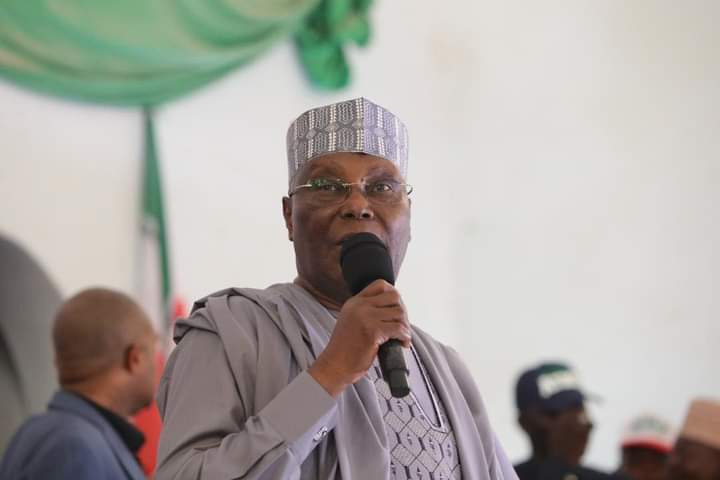Vice-President Atiku Abubakar, presidential candidate of the Peoples Democratic Party (PDP), says his proposal to privatisate the Transmission Company of Nigeria (TCN), refineries and the rail sector, is to promote growth and efficiency.
He said this in a statement issued on Tuesday by Paul Ibe, his media aide.
The development comes hours after the National Union of Electricity Employees (NUEE), in a statement, rejected Abubakar’s agenda on deregulation.
According to a statement issued on Monday by Joe Ajaero, NUEE general secretary, the proposal by the PDP candidate will be counter-productive, conserdering past experiences.
Advertisement
“Alhaji Abubakar Atiku was the Chairman of the National Council on Privatisation (NCP), a government committee entrusted with the responsibility of managing the privatisation programme initiated by the Olusegun Obasanjo administration to handle the disposal of public enterprises,” Ajaero said.
“Of the over 60 enterprises privatised when he became NCP Chairman in 1999, how many of them are functioning optimally? From the Osogbo Steel rolling mill which has become a glorified warehouse to the abysmal performances of the privatised Generation Companies (GenCos) and Distribution Companies (DisCos) over eight (8) years after privatisation.”
Responding in a statement by his media aide, Atiku maintained that the proposal on privatisation is in the interest of ensuring sustainable growth.
Advertisement
“It is important to emphasise that actively promoting private sector participation in infrastructure development will be beneficial to the economy. It is also inevitable that we incentivise the private sector to take risk and invest in the economy for the following reasons,” the statement reads.
“There is no telling that Nigeria’s huge infrastructure deficit is making businesses uncompetitive and stunting economic growth. The supply of efficient infrastructure, including roads and rail transportation, communication, adequate power etcetera is extremely important for the economy to grow and create much-needed jobs.
“Therefore, to build the economy of our dreams, we must increase the stock and improve the quality of our infrastructure. Inadequate infrastructure has been identified as the most problematic factor for doing business in Nigeria.
“In terms of actual spending, Nigeria currently spends less than 1% of its annual GDP on infrastructure as against the required levels of between 3%-5% of annual GDP. This shortfall has created a deficit, estimated at USD 3 Trillion over the next 30 years.
Advertisement
“Our overwhelmed public sector does not have the resources or expertise to deliver. While our financing requirement is approximately 100 billion USD per annum, Nigeria’s entire budget is only USD 30 billion. The National Development Plan envisages that 80% of all investments will come from the private sector.
“Regrettably, Nigeria’s core infrastructure sectors are not operating efficiently. Almost all the infrastructure sectors from roads, railways, housing, power, and energy are operating below potential. Over the years, we have observed how these enterprises consume huge public resources while offering poor quality services. Many of these State-owned Enterprises have become a source for political patronage, corruption, and rent seeking to the detriment of Nigeria’s long-term economic growth.
“For example, Nigeria’s refining infrastructure remains poor despite the perennial injection of unending public resources for turnaround maintenance. The country’s refining capacity per capita is 0.002 bpd/capita compared to Libya’s 0.06 bpd/capita and South Africa’s 0.01 bpd/capita. As of today, Nigeria imports over 80% of its refined products to meet its current needs and is said to be the largest importer of PMS in the world, with significant balance of trade implications.
“Sadly, the fiscal cost of maintaining these State-Owned Enterprises is enormous, and it comes with even greater opportunity costs. By holding unto these underperforming enterprises, Nigeria is sacrificing investments in critical areas, including education, health, water, sanitation, and rural infrastructure.”
Advertisement
He also said the cost of rehabilitating refineries, “expected to gulp US$1.55 billion” in the first phase is “huge”, adding that Nigeria cannot afford such funding, considering “its current precarious fiscal position and daunting development challenges”.
According to him, while the Bureau of Public Enterprises (BPE) lists “67% of the 142 privatised firms” as performing, there are still many benefits to be derived from privatisation as seen in the telecommunications sector.
Advertisement
“Liberalised firms may face difficulties as they transit from the old culture of rent seeking and dependence on government for survival, to a new business culture that is driven by efficiency and competition. But Atiku Abubakar will ensure that his economic reform measures are accompanied by a series of mutually supportive activities aimed at easing these difficulties and making the reform measures impactful,” the statement reads.
“Finally, we shall not hold brief for the BPE, as they are best suited to answer some of the questions raised by NUEE for example, who bought the companies and what process was followed, etcetera.”
Advertisement
Add a comment






